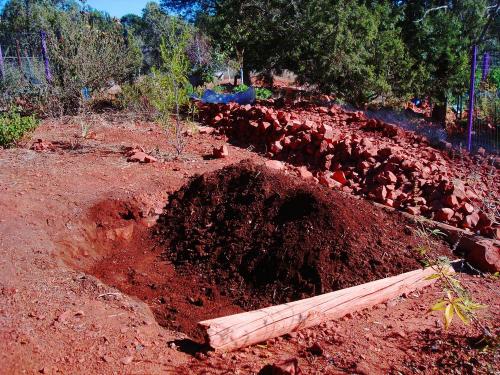Hi Folks,
I originally clicked on this post because I had just turned my compost pile for the last time this year and compost was on my mind. I stopped adding to the pile back in August, let it heat up super well and now the worms are finishing up the last bits of it. And since I just finished planting my last fruit trees for this year (a Chocolate, a Coffeecake and a Hachiya persimmons, they sound so yummy!) I thought I deserved a bit of a break so I would research a bit about compost. Haven't done it in years and many things have probably changed. I thought maybe a couple of you just might be interested in what I found, if not, don't bother reading this.
I didn't find much recent info on basic compost but I did find lots of info about the regulations pertaining to 'organic' compost. Interesting! These articles refer to 'government labels' of 'organic' compost. So, our government agencies such as the USDA states that most of the regulations, inspections and testing for all agricultural products are at the state or local levels, some more/a lot less stringent than others, so buyer beware. States like Washington became very pro-active after the big uproar and resulting lawsuits over heavy metals in Ironite 25 years ago and enacted strict regulations and do a lot of testing on agricultural products. But many states like mine don't seem to bother.
The EPA says.... Composting is the controlled, aerobic (oxygen-required) biological decomposition of organic materials by microorganisms. Organic (carbon-based) materials can include grass clippings, leaves, yard and tree trimmings, food scraps, crop residues, animal manure and biosolids.
https://www.epa.gov/sustainabl... .
According to our government agencies.... the USDA rules for organic production....
https://www.ams.usda.gov/rules... says....Compost that is made from allowed feedstock materials (either nonsynthetic substances not prohibited at § 205.602, or synthetics approved for use as plant or soil amendments).
According to the Code of Federal Regulations....https://www.ecfr.gov/current/title-7/subtitle-B/chapter-I/subchapter-M/part-205/subpart-C/section-205.203
#205.203(d) A producer may apply....(d1)A crop nutrient or soil amendment included on the National List of synthetic substances allowed for use in organic crop production. (d5) A plant or animal material that has been chemically altered by a manufacturing process: Provided, That, the material is included on the National List of synthetic substances allowed for use in organic crop production established in § 205.601.
The USDA website referred to the...
https://www.compostingcouncil.... These are some definitions...
Compostable (adj): capable of undergoing aerobic biological decomposition in a compost system, such that the material becomes visually indistinguishable and breaks down into carbon dioxide, water, inorganic compounds, and biomass. Compostable Product (n): Any product specifically manufactured to break down in a compost system at the end of its useful life. May be made from plastic, paper, or plant fibers, along with other ingredients that provide necessary form and functionality. ??
According to
https://www.scarabmfg.com/what... which make commercial composter machines....Problems you can encounter with commercial composting....Contamination: Unfortunately, contaminants can get into your compost piles at any stage of the process. Pesticides and herbicides can enter your piles when you make them, while heavy metals and bacteria can enter later on.
Just so you can be fully informed this is their list of accepted synthetic substances...
https://www.ecfr.gov/current/t...
I don't know about you but synthetic substances and other ingredients that can be broken down to become visually indistinguishable doesn't sound very 'organic' to me. This might be why most of the bags of compost for sale here in my neighborhood are similar to these I found online and say only.... Ingredients: Compost.
https://www.amazon.com/dp/B0916DR3MS/ (zoom the front of the bag.)
https://www.amazon.com/dp/B08KJRCW2D/ (See 'Questions/Ingredients)
One has a unique way to list it's ingredients...
Ingredients: Regionally formulated and contains a blend of compost......... and one or more of the following: Canadian Sphagnum peat moss or peat, processed softwood bark, forest products, perlite, vermiculite or peanut hulls, seaweed and shrimp compost. (They don't say what's in the compost part).
Please keep in mind that these requirements are for government labeled 'organic' products and regular non-organic products don't have even these restrictions. As I read the list of approved synthetic ingredients it didn't seem so bad except for all the sanitizers and herbicides and plastic weed barriers and squid byproducts from food waste processing only? and inerts of unknown toxicity? My imagination is just not creative enough to come up with all the crazy stuff they could possibly be using but I would rather not put this stuff in my garden.
Granted, I also noticed many bags of very expensive compost (if you can afford them, I can't) that include some really great stuff. I haven't seen any predominantly made from rice hulls yet, at least not here. And I know that organizations like OMRI have much stricter guidelines. But I'd rather stick to the stuff chilling in my backyard. I know exactly what's in it. And I know it's good stuff! Just saying. Happy gardening everyone.
Debbie

